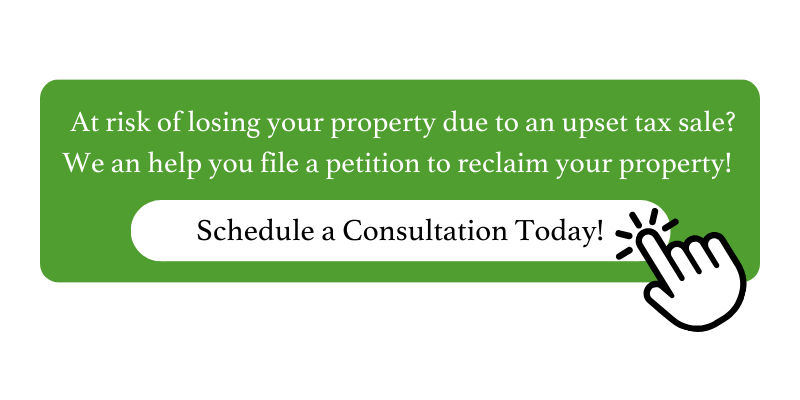Facing an upset tax sale can be a homeowner’s worst nightmare. It’s the moment when you realize your property might be sold to cover unpaid taxes, and you may need to pay property taxes in a short time frame. But don’t panic just yet. Understanding upset tax sales could be your first step toward saving your home or making informed decisions about your property.
An upset tax sale occurs when local governments auction off properties with delinquent taxes. This process affects thousands of homeowners each year, often catching them off guard. Whether you’re a worried homeowner, a potential investor, or just curious about real estate processes, grasping upset tax sales is crucial in today’s property market. The deed sale could be coming up faster than you think.
What Exactly is an Upset Tax Sale?
An upset tax sale is a public auction where properties with unpaid taxes are sold to the highest bidder. It’s called “upset” because there’s a minimum bid set, also known as the “upset price”, which covers the taxes owed, plus any additional fees and costs.
In Pennsylvania, for instance, these sales typically happen once a year, often in September. The Tax Claim Bureau, also called the County Tax Claim Bureau in some counties, handles these sales, aiming to recoup unpaid property taxes for the local government.
How Does an Upset Tax Sale Work?
The process isn’t as simple as just showing up and bidding. Several steps are involved:
- Notification: The bureau must notify property owners about the impending sale.
- Publication: The sale is advertised in local newspapers, and put on a sale list.
- Registration: Potential bidders must register beforehand.
- Auction: Properties are auctioned to the highest bidder meeting the upset price.
- Payment: Winning bidders must pay in full, usually within a short timeframe.
It’s worth noting that an upset tax sale doesn’t automatically clear all liens on a property. Unlike a judicial sale, mortgages and other liens often remain intact after an upset sale, impacting both real estate taxes and estate taxes.
Why Do Upset Tax Sales Happen?
The primary reason for upset tax sales is simple: unpaid property taxes. When homeowners fall behind on their tax payments, local governments need a way to recover that lost revenue. That’s where the upset tax sale comes into play.
However, it’s not just about collecting money. These sales serve several purposes:
- Recovering unpaid taxes for local services such as school taxes.
- Encouraging timely tax payments.
- Potentially transferring neglected properties to new owners who might improve them.
Understanding these motivations can help both property owners and potential buyers navigate the process more effectively as real estate tax sale law is very complex.
The Impact on Homeowners
For homeowners, the threat of an upset tax sale can be devastating. Imagine the home you’ve lived in for years potentially being sold because of unpaid taxes.
It’s a scary thought, but there are often options available before it reaches that point. These often include paying delinquent taxes in a payment plan on a monthly basis.
Prevention is Key
The best way to avoid an upset tax sale is to stay current on your property taxes. If you’re struggling to pay, many local tax offices offer payment plans or hardship programs.
What If Your Property is Listed for Sale?
If your property is already listed for an upset tax sale, don’t lose hope. You typically have until the day of the sale to pay the delinquent taxes and have your property removed from the list.
Some counties even allow partial payments to stop the sale, as long as you enter into a payment agreement for the remainder. This will help stop the county tax claim bureau from selling your property in an estate tax sale.
Remember, communication is crucial. Reach out to your local tax claim bureau as soon as possible to discuss your options and find out when taxes owed are due.
For Potential Buyers: Opportunities and Risks
Upset tax sales can present opportunities for investors or individuals looking to purchase property at potentially below-market prices. However, it’s not without risks, and you could find yourself involved in litigation property.
Opportunities
- Potential for below-market purchases.
- Opportunity to improve neglected properties.
- Possibility of good returns on investment.
Risks
- Properties are often sold “as-is” with no inspections.
- Existing liens may remain on the property.
- Possible legal challenges from previous owners.
- Potential for costly repairs or renovations.
If you’re considering purchasing at an upset tax sale, it’s crucial to do your due diligence. Research the property thoroughly, understand all associated risks, and consider consulting with a real estate attorney who is well-versed in tax sale law.
The Legal Landscape of Upset Tax Sales
Upset tax sales are governed by specific laws that vary by state and sometimes even by county. These laws detail things such as how much money monthly for delinquent taxes needs to be paid to avoid a sale, as well as personal service protocols.
In Pennsylvania, for instance, the Real Estate Tax Sale Law outlines the procedures for these sales, including the real estate tax sale law.
One crucial aspect of the law is the notification process. Property owners must be given adequate notice before their property can be sold. This typically includes:
- Publication in local newspapers.
- Certified mail to the property owner.
- Posting of the property.
If these notification requirements aren’t met, it could provide grounds for the sale to be invalidated. This is why it’s crucial for both buyers and sellers to understand the legal requirements in their area, such as how upset sales occur, or when sales occur for properties sold in a Pennsylvania upset tax sale.
After the Sale: What Happens Next?
The aftermath of an upset tax sale can be complex, depending on whether you’re the previous owner or the new buyer, and if there is an existing tax assessment.
For Previous Owners
If your property was sold at an upset tax sale, you might still have options. Some jurisdictions offer a redemption period during which you can reclaim your property by paying the taxes owed plus additional fees.
However, this isn’t available everywhere, so it’s essential to check local laws and see if there are options such as paying taxes owed.
In some cases, if proper notification procedures weren’t followed, you might be able to challenge the sale in court. This is where legal counsel becomes invaluable.
For New Buyers
If you’ve successfully purchased a property at an upset tax sale, your next steps typically include:
- Paying the full amount within the required timeframe (often 10 days).
- Receiving a deed to the property.
- Addressing any remaining liens or encumbrances.
- Potentially dealing with evicting current occupants (if applicable).
Remember, buying at an upset tax sale doesn’t automatically give you a clear title. You may need to go through additional legal processes to fully secure your ownership.
Preventing Future Upset Tax Sales
For homeowners who’ve experienced or nearly experienced an upset tax sale, prevention becomes a top priority. Here are some strategies to avoid future issues:
- Set up automatic payments for property taxes if possible.
- Create a dedicated savings account for property taxes.
- Stay informed about local tax rates and payment deadlines.
- Communicate with your local tax office if you’re facing financial difficulties.
- Consider applying for homestead exemptions or other tax relief programs if eligible.
Remember, many local governments prefer to work with homeowners rather than go through the upset tax sale process. Don’t be afraid to reach out and explore your options if you’re struggling with payments.
The Broader Impact of Upset Tax Sales
While upset tax sales primarily affect individual property owners and buyers, they also have broader implications for communities and local governments.
Community Impact
Upset tax sales can lead to changes in neighborhood dynamics. On one hand, they might result in neglected properties being transferred to new owners who will improve them.
On the other hand, they can sometimes lead to displacement of long-time residents, particularly in gentrifying areas, which may make it more difficult to find a place to pay property taxes.
Government Perspective
For local governments, upset tax sales are a necessary tool to ensure tax revenue. However, they’re often seen as a last resort. Many jurisdictions prefer to work with homeowners to arrange payment plans or explore other solutions before resorting to a sale. Some areas are exploring innovative approaches to address tax delinquency while keeping residents in their homes.
FAQs about Upset Tax Sales
What is an upset tax sale in PA?
An upset tax sale in Pennsylvania is a public auction where properties with delinquent taxes are sold to recover unpaid property taxes. These sales are typically held annually in September by the county Tax Claim Bureau. The minimum bid, known as the “upset price,” must cover all taxes, interest, penalties, and costs associated with the sale.
How long do you have to redeem a tax sale in PA?
In Pennsylvania, there is typically no redemption period after an upset tax sale. Once a property is sold at an upset tax sale, the previous owner generally loses their right to redeem the property.
However, if the property doesn’t sell at the upset sale, it may be offered at a judicial sale later, which does have a redemption period. It’s also possible the sale will be set for a later date if it doesn’t sell at the upset sale.
Does Pennsylvania have tax lien sales?
Pennsylvania doesn’t have tax lien sales in the traditional sense. Instead, it uses upset tax sales and judicial sales to address delinquent property taxes. In these sales, the actual property is sold, not just a tax lien certificate as in some other states.
Can I get my property back after a tax sale in PA?
After an upset tax sale in Pennsylvania, there’s usually no redemption period for the previous owner to reclaim the property. However, if there were legal issues with the sale process, such as improper notification, you might be able to challenge the sale in court. It’s crucial to act quickly and consult with a legal professional if you believe your property was wrongfully sold.
Conclusion
Navigating upset tax sales can be challenging, whether you’re a homeowner trying to keep your property or an investor looking for opportunities. Understanding the process, knowing your rights, and staying informed about local laws and resources are key to making the best decisions in these situations.
Remember, if you’re facing the possibility of an upset tax sale in Fayette County or Westmoreland County, don’t wait to take action. Reach out to your local tax office, explore payment options, and consider seeking legal advice. For potential buyers, always do your due diligence before participating in an upset tax sale. With the right knowledge and preparation, you can navigate this complex process more effectively.







